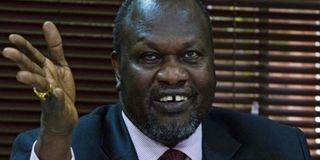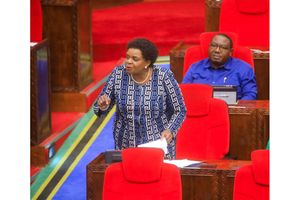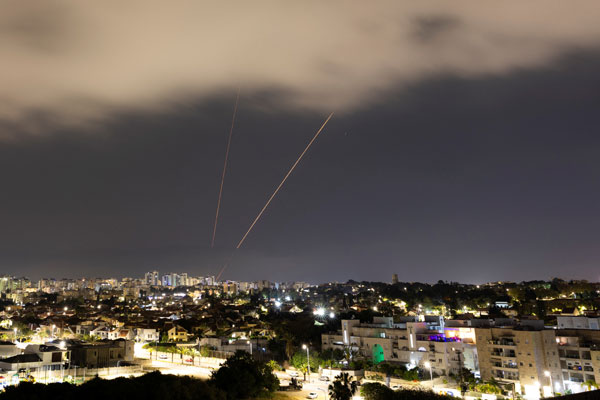Where will South Sudan rebel leader Machar go?

South Sudan rebel leader Machar. His future appears to rest in foreign hands and is largely dependent on whether the international community is willing to move ahead on a peace agreement without him. PHOTO I FILE
What you need to know:
He resurfaced in the neighbouring Democratic Republic of Congo on August 18 and then flew to the Sudanese capital Khartoum for unspecified medical treatment. Aides say Machar is eager to reassert himself politically as soon as he is fit and well by visiting regional countries that are members of the IGAD bloc (Intergovernmental Authority on Development), which has led successive rounds of peace talks.
Nairobi. War-torn South Sudan’s slide into chaos resumed last month with fresh fighting in the capital Juba that forced rebel leader turned vice president and peace deal signatory Riek Machar to flee.
With the spike in clashes came a surge of abuse of civilians by armed men including rape, murder and looting. A year-old peace deal was only partly implemented and, as July’s battles showed, was insufficient to stop the war -- yet regional and foreign powers cling to it as the country’s only hope.
So where next for hopes of peace in South Sudan and for rebel leader Machar?
Is there still a peace agreement in South Sudan?The deal, signed in August last year by rebel leader Machar and President Salva Kiir, hangs in the balance. Machar has fled the country and been replaced as vice president by Taban Deng Gai, who leads a Juba-based faction of the opposition SPLM/A-IO.
Deng’s appointment has yet to be fully accepted by either Machar loyalists or the international community that forced through the peace deal. During a visit to Kenya this month, US Secretary of State John Kerry hinted at US acceptance of the new reality when he described Machar’s ouster as a “replacement of personnel” that was legal under the agreement.
Where is rebel leader Riek Machar?Machar fled Juba on foot after fighting in the city ended on July 11.
He resurfaced in the neighbouring Democratic Republic of Congo on August 18 and then flew to the Sudanese capital Khartoum for unspecified medical treatment. Aides say Machar is eager to reassert himself politically as soon as he is fit and well by visiting regional countries that are members of the IGAD bloc (Intergovernmental Authority on Development), which has led successive rounds of peace talks.
Who backs Machar and who is against him? Machar left a sharply divided (and, in Juba, militarily defeated) former rebel movement in his wake when he fled. Deng enjoys the backing of Kiir but field commanders, armed forces and SPLM/A-IO leaders outside Juba continue to back Machar -- for now.
“Machar is still an influential leader as long as he is alive,” said James Okuk, a political scientist at Juba University.
Regional bloc IGAD has said that Deng should step aside when Machar returns, but the longer Machar is absent the stronger Deng’s claim becomes and he may yet consolidate his position among the former rebels too.
One way to achieve this, analysts say, would be for Deng and Kiir to move ahead with integrating rebel forces into the national army, effectively disarming Machar while implementing a key provision of the peace accords.
A possible Machar comeback?
Can Machar stage a comeback?Machar loyalists are being rooted out of South Sudan’s parliament and cabinet and being replaced with Deng’s allies, weakening Machar’s influence. Five out of 10 SPLM-IO ministers have been replaced along with 25 out of 50 MPs. Meanwhile Deng has quickly taken up the functions of the vice presidency, undertaking official visits to both Kenya and Sudan in recent weeks.
Machar’s future appears to rest in foreign hands and is largely dependent on whether the international community is willing to move ahead on a peace agreement without him.
Will the promised UN ‘protection force’ be deployed?On August 12 the UN Security Council approved the deployment of a so-called “protection force” in South Sudan to bolster the much-criticised peacekeeping operation there and enable the implementation of the peace agreement.
Machar has said he will not return to Juba until a “neutral force” is in place and his safety guaranteed, but Kiir’s government has resisted the UN plan, insisting it is a challenge to South Sudan’s sovereignty and that further negotiations over the force’s mandate are needed.
While South Sudan has stopped short of refusing to accept more peacekeepers, the government has yet to accept them either, and it is impossible to imagine UN soldiers being deployed against the will of the government.
Meanwhile, the international community has been urged to respond to the refugee crisis caused by fighting in South Sudan in the same way it responded to the crisis in Europe.
The UN refugee agency, UNHCR, says 88,533 people have fled South Sudan for Uganda since July when fighting broke out between rival factions in the capital of the world’s youngest country.
Uganda carries the burden
Uganda, among the world’s poorest countries, has won praise for hosting nearly 320,000 South Sudanese refugees as well as others fleeing political unrest and violence in Burundi and the Democratic Republic of the Congo.
“Uganda is in the middle of an unstable region and being a stable and peaceful country they are somehow compelled to receive thousands of refugees every day. In Europe the same number of new arrivals per day could bring governments down,” said UN High Commissioner for Refugees Filippo Grandi during a visit to camps in northern Uganda on Monday.
The UNHCR has received less than a third of the funding needed to cope with the humanitarian emergency compared to over two-thirds for the refugee crisis in Europe, Grandi said. “This is not right, we need to put this right,” he said.
“Last year Europe received one million refugees. Kenya, Ethiopia and Uganda each host 600,000-700,000 refugees, that’s a lot of people. They deserve support,” he said. “This is where the refugee crisis is and this is where the international community should focus.”
Grandi was speaking at Pagarinya Settlement Camp in northern Uganda where more than 22,000 refugees arrived within two weeks of fighting breaking out in the South Sudanese capital, Juba.
The UNHCR registers all of the South Sudanese migrants entering Uganda.
The government of Uganda gives each refugee household a plot of land to cultivate and materials to build a basic shelter.
“Where else in the world could 22,000 refugees be resettled and given a plot of land so quickly after arriving?” asked Grandi.
He said South Sudanese people “who have fled from the most appalling violence and hardship” were being let down by an international community that “has not upheld their responsibilities in the manner that it should”.
Grandi also appealed to the leaders of South Sudan to “behave responsibly”.
“There’s fighting, tribal divisions, power struggles between individuals and leaders: this has to stop,” he said, adding that during his visit he had heard multiple testimonies from survivors of violent attacks, rape, killings and abductions.


